Voters Still Not Caring Very Much About The Midterms, And That’s No Surprise
Polls continue to show that most Americans are largely tuning the midterms out.
The midterm elections are now less than two weeks ago, but the American people don’t seem to care very much:
Americans can care less.
Candidates, parties and outside groups have spent months—and hundreds of millions of dollars—campaigning in states with tight races that could determine control of the Senate. The one thing they can’t seem to do is make people care.
In the last two midterm cycles in 2006 and 2010, interest in the election increased dramatically between June and October of the election years, rising to 61% from 55% in 2006 and to 61% from 51% in 2010. This year, interest has declined—to 50%, down from 51% in June, according to the latest Wall Street Journal/NBC News poll, though the decline is within the margin of error.
Bill McInturff, the GOP pollster who conducted the survey with Democratic pollster Fred Yang, said this year is the first he can remember to not see any bump in interest at all in the months leading up to Election Day. Such disinterest is “something you haven’t seen before in a generation,” he said.
Demographic groups that generally support Republicans tended to be more enthusiastic about this election than past elections, in particular voters over the age of 65, supporters of the conservative tea-party movement and white men. Those findings are unsurprising, given that midterms tend to draw older, white voters—giving Republicans an advantage.
Two left-leaning demographic sets were more enthusiastic about this election than past elections: African-Americans and those making less than $30,000 a year.
On the other side, the groups professing less interest in this election than past elections include independent voters, young voters and voters who cast ballots for PresidentBarack Obama in 2012—though the last two were by a small margin.
The numbers in this NBC/Wall Street Journal poll, which was released last week, mirror similar numbers that we’ve seen elsewhere. A Gallup poll in late September, for example, showed that large numbers of Americans didn’t care very much about which party ended up controlling the Senate in the 114th Congress. A subsequent poll showed that voter engagement with the elections was more similar to the lower turnout elections in 1998 and 2002 than it was to the levels we saw in 2006 and 2010, a number that suggests that overall turnout this year is likely to be lower than it has been in the last two mid-term election cycles. As I noted when I wrote about this earlier this month, that largely poses a problem for Democrats since it suggests that they will have difficulty bringing to the polls those voters who are likely to support their candidates but whom are unlikely to vote in midterm elections to being with. Indeed, when you look at these “enthusiasm” polls, you find that there is small but statistically significant difference between likely Republican voters and likely Democratic voters that gives an edge to the GOP and is yet another cause for optimism on the part of the GOP in their hopes of taking control of the Senate this year. As far as the general public goes, though, this year’s midterm seems to be one big snooze fest, and that’s likely to be reflected in the turnout numbers.
Nate Cohn is probably among those who are baffled by this lack of interest on the part of the general public, because he argues that this is a great election:
I have a confession: I think this is a great election. It’s way better than 2012. All around, it might be the best general election in a decade.
There are a dozen competitive and close Senate contests and, for good measure, there are another dozen competitive governors’ contests. Better still, these close Senate races add up to something meaningful and important: control of the Senate.
These contests might lack the drama of a presidential election — and there are plenty of signs of voter apathy in this cycle — but they make up for it with their diversity, collectively addressing some of the most important and analytically compelling questions in electoral politics.
The core question of this election remains unanswered: Is it a wave? Is the national environment extremely good for Republicans, or are they mainly poised to gain because the set of battleground states just happens to favor them?
The answer hinges in part on whether Republicans can win in blue states or presidential battleground states, like Colorado, Iowa and North Carolina. Republicans ought to fare well there if this is indeed a wave election year. It also hinges on whether Republican governors can win competitive contests in states like Florida and Michigan, where Republican incumbents have no business losing in a wave election.
(…)
This year’s contests might also be remembered as a milestone in the longer-term trend of growing Democratic strength in the Southeast, where in-migration and rapid demographic change are eroding the G.O.P.’s traditional advantage. How close is Georgia to turning blue? To what extent can Democrats mobilize their so-called new coalition in an off-year election in Florida and North Carolina, where Republicans have already lost their advantage in presidential elections
If you’re someone who writes about politics for a living, or just someone like myself who follows elections and polling as something of a hobby the way other people follow sports statistics, Cohn’s argument make a lot of sense. There are an unusually large number of competitive races this year, for example, including races in states such as Georgia, Kentucky, Kansas, Iowa, and South Dakota that are much closer than many people anticipated that they would be and which could go either way over the next two weeks. Notwithstanding the fact of gridlock in the Washington, the question of who ends up controlling the Senate will have a profound impact on how American politics proceeds over at least the next two years. If Republicans win the Senate, then President Obama is likely to be considered a “lame duck” almost from the moment the new Congress takes power, and will find himself in a far weaker bargaining position than he is right now on everything from the budget to getting Judges and other Presidential appointees confirmed during the final years of his Presidency. Whether the GOP wins control or not, the results of the midterms will have a real impact on the course of the battle for the 2016 Presidential nomination in that party, as well as the potential playing field for the Presidential and Congressional elections in two years. The outcome of the elections will also decide the fate, once and for all, of issues like comprehensive tax reform and immigration reform for the remainder of Barack Obama’s Presidency if not longer. So, if you’re someone who is into the “game” of politics, or cares about these issues, the midterms are indeed important.
Despite all of this, though, it’s rather obvious, that Americans in general don’t share Cohn’s (and mine) enthusiasm for the election, and Peter Suderman argues that it has to do with much more than the fact that most Americans are “political geeks” for lack of a better term:
With just two weeks until election day, the most striking thing about the 2014 midterm may be how petty and substance-free it is. No major policy issue has defined this election; no major legislation is immediately at stake. It is possible to find candidates talking about a variety of policy issues—Obamacare, the minimum wage, immigration, the Export-Import bank, and more—but the implications are described almost entirely in political terms. For the most part, the focus for both parties is not on what they would do, but what they wouldn’t, not who they are, but who they aren’t. It’s an election about nothing, except, perhaps, who one hates the most.
(…)
The result is an election in which Democrats cannot run on what they have done, and Republicans cannot run on what they will do. So petty squabbles and Twitter-friendly soundbites dominate the news as each side attempts to drive turnout by campaigning the notion that the other party is worse—for women or for struggling workers, for the economy or for America’s place in the world. It’s not an election about which side to vote for. It’s an election about which side to vote against.
The bipartisan emptiness of this midterm election, and the intense focus by both parties on turning out core voters rather than on broadening party appeal, suggests the deep exhaustion of both parties and their respective agendas. (One reason why Ebola has received so much attention is that it helps fill the void.) At this point, both Democrats and Republicans are running on policy fumes.
Members of the public see less and less to like from almost any politician, even the ones they voted for themselves.
Suderman is largely correct here. More so than ever before, both political parties are spending their time focusing on one of two things. Either they keep pushing out polished, poll-tested messages that sound good but are largely lacking in substance of any kind. You can see examples of that in things such as the fact that there is often such frequent similarity between the “platforms” that candidates publish on their websites and highlight in their campaign literature. Quite often, these items come from party advisers and campaign consultants who work for multiple candidates and who have crafted messages that they contend will appeal to the widest possible number of voters without actually saying anything controversial. Several times this year, Republican candidates such as Monica Wehby in Oregon have gotten into trouble in the media for blatantly copying material that has appeared on the websites of other candidates but, again, that’s just a reflection of how modern campaigns work. In addition to constant repetition of poll-tested material, the other thing Americans hear from modern campaigns, of course, are the messages that are designed to appeal primary to strong partisans and base voters, message that often slip into what many voters in the middle of the road would consider extreme. Combine those two things and it’s easy to see why many Americans feel like candidates running for office, especially at the Congressional level, aren’t really talking to them and aren’t really saying anything about how they are going to address the issues that concern them every day when they go to work and go about their day.
Added in to all of this, of course, is the general cynicism that the American public has developed about government in general and the Federal Government in particular. Poll after poll for the better part of a decade now has shown that the American people have little faith in the institutions of Government, and Congressional job approval continually hits new lows to the point where one wonders who the 9-11% of the public who does think that Congress is doing a good job actually is, other than perhaps the class of people who benefit from the few things that Congress actually does do these days. Moreover, nothing that either party has said or done this year appears to give any hope to voters that the future will be anything other than a continuation of the partisan warfare and gridlock that we’ve become used to in recent years.
Given all of that, can you really say you’re surprised that Americans are tuning this election out? I’m certainly not.
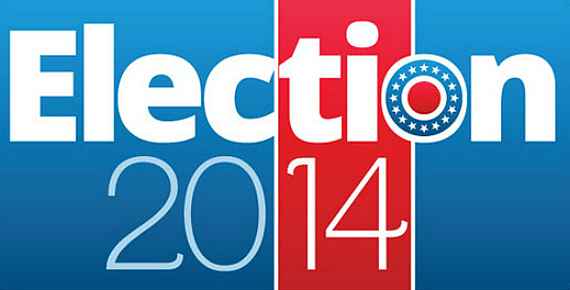

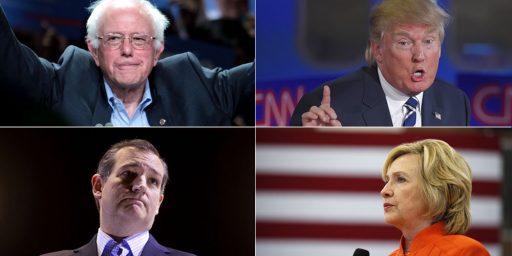
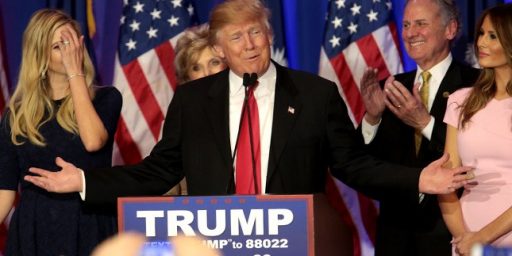
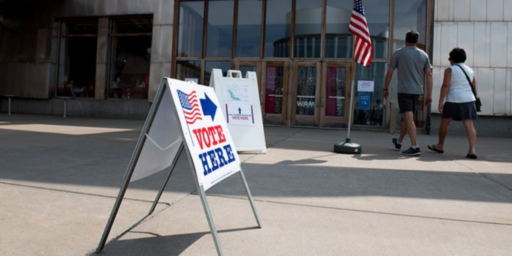
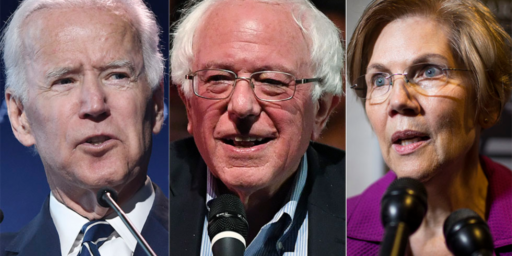
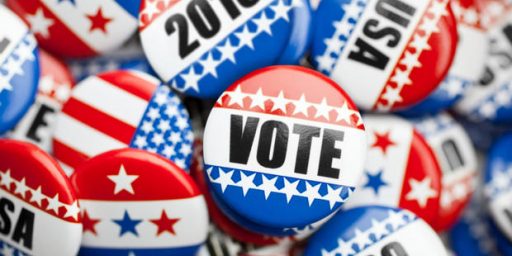
o/~ I hate these word crimes / Like “I could care less” / That means you do care / At least a little o/~
We’ll see how much they care when the inmates are running the asylum.
Like you, Doug, politics is a substitute for sports for me. It’s competition, there’s a game of some sort going on every day, I can root for my “home” team, there’s the joy of victory and the agony of defeat. However, it’s more interesting than sports in that the outcomes actually matter.
Yes, nationally it’s a fascinating election. But here in OH-2 neither Senator is running, my Tea Party GOP “representative” will be re-elected easily, the governor is an arse, but will also be easily re-elected. Nothing exciting is going on locally except the ads for the KY senate race across the river. I’ll vote, but mostly out of habit. Outside of the handful of states with close Senate races, I expect most people have a similar local situation.
@C. Clavin:
We’ll see how much they care when the inmates are running the asylum.
Which set of inmates? The ones that want to screw the middle class and give Wall Street everything they want or the inmates that want to give Wall Street everything they want and screw the middle class?
Disinterest can either come from a sense of satisfaction with how things are going or from a sense of powerlessness on the capability to change anything.
I think it is the latter.
Gotta admit, my give-a-crap factor is about zero for this one. My House representative’s seat is entirely safe, Mark Warner is going to beat Ed Gillespie like a rented mule, there are no state legislative elections in Virginia this year, and the only ballot measure is one that exempts the surviving spouses of KIA servicemembers from property tax.
It may be a great election elsewhere, but in Virginia it’s a snoozefest.
In the 2014 primary elections Chicago voter turnout was 16%. Suburban Cook County turnout was even lower.
If turnout is that low (or lower) in the general election, anything can happen. At that point it all depends on whose voters turned out.
In statewide races, Pat Quinn’s re-election chances are very much dependent on that Chicago and suburban Cook Country turnout. If he can’t turn out Chicago voters, his goose is cooked. That, no doubt, is why the president showed up last night to stump for him here. Whatever his approval ratings in battleground states, his approval rating among Chicago’s most faithful Democratic voters remains high. Even if he’s not on the ballot they’ve got to turn out.
Maybe part of the reason for the lack of interest is that so much of the focus has been on the Senate elections. There’s no presidential contest, and control of the House isn’t really in play. RCP puts just nine Senate seats in the “toss-up” column, and three in the “lean Dem” or “lean GOP” column. That may be higher than average for the Senate, but it still only involves a tiny fraction of the country. (According to my calculations, it’s somewhere from 15-20% of the total number of registered voters nationwide.) Is voter apathy really unusually high in the states where there are competitive Senate elections?
Between September 1st October 20th of 2006, when there was a 6 year itch midterm and lots of close senate races that could flip the senate, ABC world news tonight mentioned the upcoming election 36 times, CBS evening news mentioned the elections 58 times and NBC nightly news mentioned the elections 65 times.
Between September 1st October 20th of 2014, when there is a 6 year itch midterm and lots of close senate races that could flip the senate, ABC world news tonight mentioned the upcoming election 0 times, CBS evening news mentioned the elections 14 times and NBC nightly news mentioned the elections 11 times.
Then we get articles like this wondering why no one is paying attention to the election.
Media bias couldn’t have anything to do with people not paying as much attention could it?
After the GOP led Senate spends two years trying to repeal Obamacare, restrict immigration and reproducive rights, block judicial nominations, and impeach the President, I anticipate great interest in the Senate elections of 2016….
Sometimes the American public have to actually experience dysfunction before they care enough to vote.
Think about this: gas prices dropping like a rock. Elections a few weeks away. Coincidence? Right.
Imagine what prices would go to if the elections were moved to December: 60 cents a gallon !
After the elections watch gas prices zoom back up faster than the president’s helicopter heading to the golf course ! They will blame the usual: some mideast potentate sneezes, a thunderstorm hits the gulf, “unstable” stock market, the perennial “home heating fuel oil” conversion, or a refinery shuts down because a worker stubs their toe.
The gas “crisis” of the ’70’s: the biggest hoax ever pulled on the American people.
I gotta confess, I’m just barely paying attention myself this year. I’m not sure that I really even care who wins at this point. I doubt I’ll even bother to vote—and I’ve got a Senate seat to vote on.